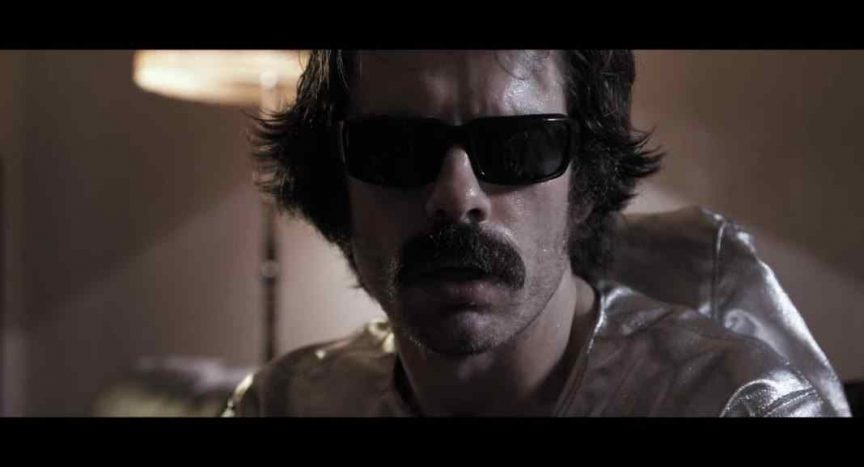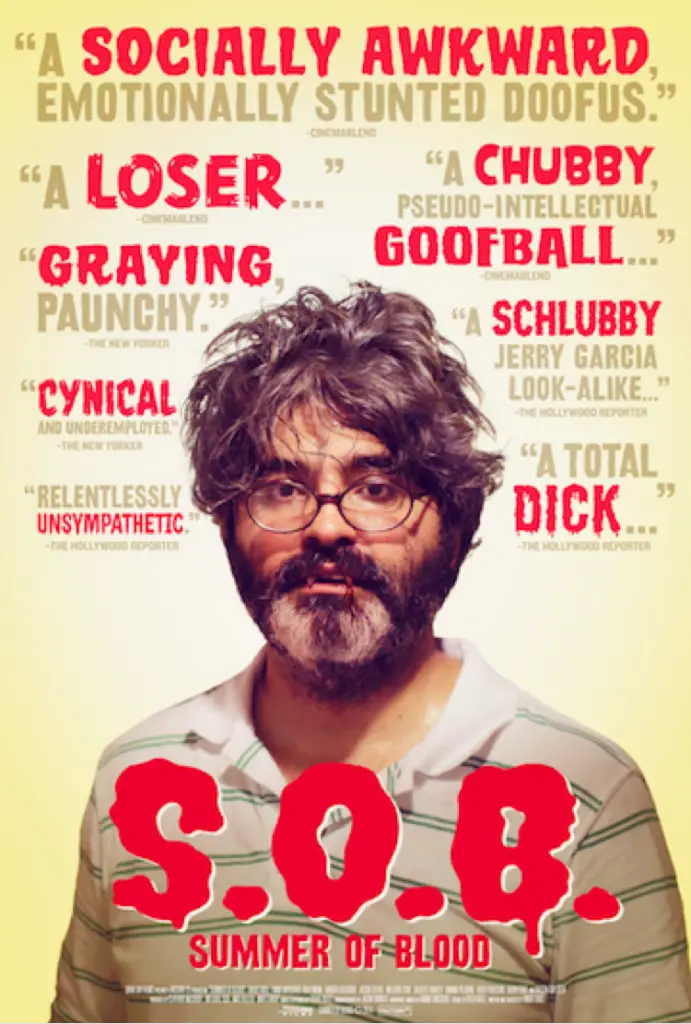Vidar the Vampire is an irreverent, black comedy that reimagines Jesus as a vampire. The film plays on the obvious connections—drinking blood and rising from the dead—to highlight some of its issues with Christianity. All of this is told through the familiar frame of Vidar (Thomas Aske Berg who also wrote and co-directed the film) telling the story to his therapist (Kim Sønderholm), who asks Vidar to start from the beginning after Vidar shows him a newsclip about the satanic rituals that took place at Vidar’s farmhouse.
Vidar was a lonely child, growing up with his mother. The kids in his neighborhoods bullied him while he ran the family farm on his own. He has a Playboy hidden in the chicken coop, which Berg and co-director Fredrik Waldeland brilliantly transition from Vidar looking at to Vidar milking a cow. Twenty years pass this way before Vidar prays to Jesus, begging to “sample” all kinds of women who are “twenty-plus.” That night, a vampire who calls himself Jesus comes to Vidar. Rather than transfer vampirism through the traditional bite on the neck, Vidar becomes a vampire by performing oral copulation on Jesus . It’s not an exaggeration when I write, this movie is wild.
Berg and Waldeland have a great sense of irony, playing what audiences are hearing against what’s happening on screen. As young Vidar does his chores, they undermine him with a folk song about how time alone is time to consider one’s great angst. As young Vidar holds hands with a girl for the first time, there’s a folk song about how drowning might be a better alternative to living. And after Vidar dies during an attempted faith healing, he rises again at his funeral as the priest says “From the earth you will rise again.” It’s very funny.
So are the comments made by the therapist, who’s dry understatements punctuate the movie’s craziest moments. After Vidar fellates Jesus, the therapist says, “I’m a little hesitant to ask what happened after you accepted Jesus.” He keeps laying on these gems throughout the film. And it needs them, because Vidar the Vampire goes to some dark places.
Jesus brings Vidar to his brothel, where the password is “The Lord sent me.” And the two of them spend a large part of the movie trying to pick up women. Jesus’s favorite move is to turn water into wine in front of dates. But the subtext is anything but funny. They’re predators, destroying the women they encounter. After Vidar peeps up a woman’s skirt, she yells at him, “Am I not allowed to wear whatever I please without worrying about dirty old pigs like you staring at my snatch?” It’s as close as any woman in the film gets to having agency. Vidar follows her home and rapes her after she passes out.
And I’ll be honest, I’m not sure whether Vidar the Vampire is making a commentary about the way Christianity disenfranchises women or disenfranchising women itself. The film is very coherent in the way it shows how a lonely young man like Vidar can be lured into dehumanizing women for his own pleasure. It’s also clear that Vidar becomes more and more unhappy because he’s acting this way, with Jesus in his ear telling him to do more of it. And to its credit, while there is a some female nudity, the camera focuses on Vidar’s reactions rather than the women’s bodies, avoiding the trap of the male gaze that so many films fall into.
But the rape is the end of that young woman’s story—her death is implied but not important enough to be on-screen—and the turning point of Vidar’s. It’s a toxic trope, called fridging where a woman is killed or otherwise harmed in order to motivate a male story. But it comes back to the question, “Is the film using a toxic trope to criticize Christianity, or is it using this trope while criticizing Christianity?”
This is all complicated further by the fact that the story is all framed by Vidar talking to his therapist. That means every detail in the story is filtered through his perceptions. The newsclip Vidar shows his therapist at the beginning seems to factually dispute Vidar’s account, so it’s unclear what’s real and what’s not. This makes it harder to parse what the filmmakers are commenting on and what Vidar is saying. The words of a character aren’t necessarily those of their creators.
Vidar the Vampire is a complex, funny film. It lampoons Christianity and dramatizes how lonely white men are radicalized with an absurdist sensibility. It’s available on VOD now via Dread Central Presents.
WICKED RATING: 7/10
Director(s): Thomas Aske Berg, Fredrik Waldeland
Writer(s): Thomas Aske Berg, Fredrik Waldeland
Stars: Thomas Aske Berg, Brigt Skrettingland, Kim Sønderholm
Release date: June 12th, 2018
Studio/ Production Co: UFOh!, Foton4 Film
Language: Norweigan
Length: 83 minutes
Subgenre: Comedy








